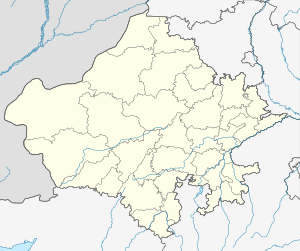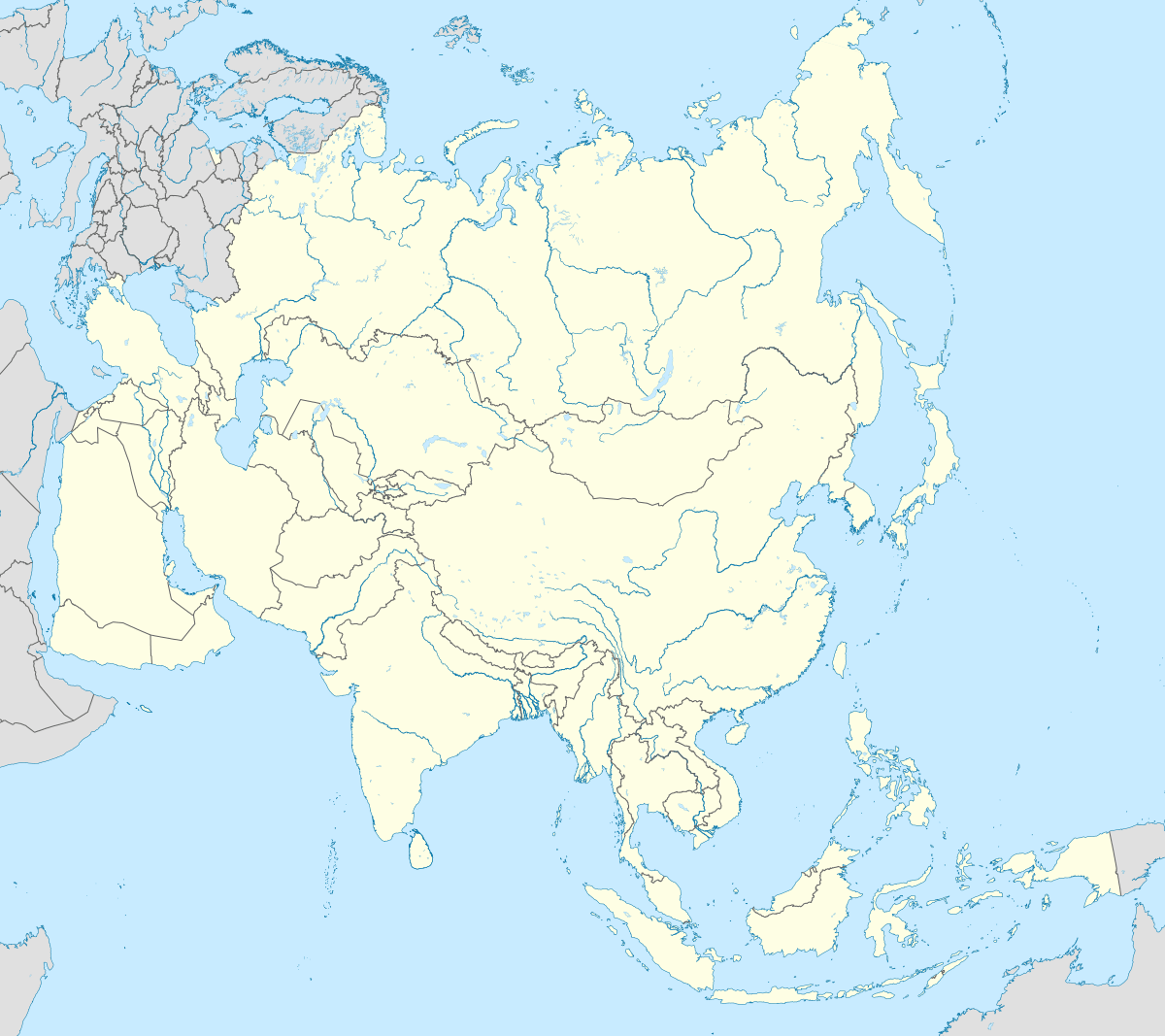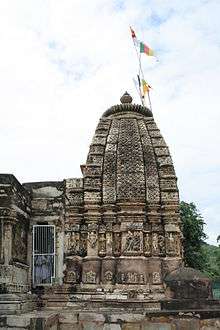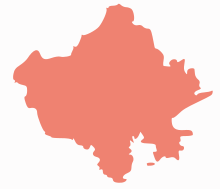Dausa
Dausa is a city and administrative headquarters of Dausa district in the state of Rajasthan, India. It is 55 km from Jaipur, 240 km from Delhi and located on Jaipur-Agra National Highway (NH-11). It is also known as "Dev Nagari."
Dausa | |
|---|---|
City | |
 Dausa Location in Rajasthan, India  Dausa Dausa (India)  Dausa Dausa (Asia) | |
| Coordinates: 26.8932°N 76.3375°E | |
| Country | |
| State | Rajasthan |
| District | Dausa |
| Elevation | 327 m (1,073 ft) |
| Population (2011) | |
| • Total | 85,960 |
| Language | |
| • Official | Hindi[1] |
| • Additional official | English[1] |
| Time zone | UTC+5:30 (IST) |
| Vehicle registration | RJ-29 |
| Website | dausa |
History
Dausa is situated in a region widely known as Dundhar. The Chouhans & Raos ruled this land in 10th Century A.D. Dausa has privileged to become First capital of the then Dundhar Region. Dausa was an important political place for Dundhar region. The Chauhan Raja Soodh Dev ruled this region during 996 to 1006 AD. Later, from 1006 AD to 1036 AD, Raja Dule Rai ruled this region for 30 years.[2]
As Dausa city is surrounded by Mahadev in five directions (Nilkanth, Gupteshwer, Sahajnath, Somnath and Baijnath), so it was named from Sanskrit word "Dhau and Sa".
Dausa has given prominent freedom fighters to the nation. Late Shri Tikaram Paliwal & Late Shri Ram Karan Joshi were amongst the freedom fighters who gave their valuable contribution for the fight for independence and for amalgamation of the Princely States to form Rajasthan State. Late Shri Tikaram Paliwal was the first elected Chief Minister of Rajasthan in 1952 after independence. Also, Late Shri Ram Karan Joshi was the First Panchayati Raj Minister of the Rajasthan state who submitted the First Panchayati Raj Bill in the Vidhansabha in 1952.
The poet Sant Sunderdas was born on Chaitra Shukla Navami in Vikram Samvat 1653 in Dausa. He was a renowned Nirgun Panthi Sant and wrote 42 Grantha, out of which Gyan Sundaram & Sunder Vilas are famous.
Geography
Dausa is located at 26.88°N 76.33°E.[3] It has an average elevation of 333 metres (1072 feet). It is one of the 5 Districts of Jaipur division (Alwar, Dausa, Jaipur, Jhunjhunun, Sikar.) and is surrounded with 6 districts, namely, Jaipur, Tonk, Sawai Madhopur, karauli, Bharatpur & Alwar.
Demographics
As of 2011 India census,[4] Dausa city had total population of 85,960. Males constitute 45,369 of the population and females 40,591. Dausa has an average literacy rate of 69.17%, lower than the national average of 74.04%: male literacy is 84.54% and, female literacy is 52.33%. In Dausa, 11,042 of the population is under 6 years of age.
Economy & Occupation
The economy of Dausa district is mainly dependent on agriculture as 68.2 percent workers in the district are either cultivators or agricultural labourers. However the district percent of such workers is higher than the state average of 62.1 percent. Work participation rate (WPR) of Dausa district has recorded 41.9 percent and gender gap in WPR is 9.5 percent points. In Dausa district among the workers the percentage of cultivators, agricultural labourers, workers in household industry and other workers (category of workers) are 57.1, 11.1, 2.5 and 29.2 percent respectively.
Travel and transportation
- Rail Network: The district is well connected by rail. It is on Delhi-Jaipur and Agra-Jaipur train route, which gives it great connectivity. The district has also one important railway station, namely, Bandikui Junction. Dausa railway station is a very important railway station of north-western railway under Jaipur division and now the new railway line is under construction and starts very soon, after this Dausa railway station will be the junction.
- Road distances: NH 11 passes through the district. It covers about 85 km in the district which includes district headquarters, Sikandra and Mahwa. Dausa is 55 km from Jaipur on NH-11 and well connected with Agra, Delhi and other surrounding districts viz. Karauli, Sawai Madhopur and Bharatpur by road. Further, NH-11A also passes through the district covering Dausa & Lalsot Tehsil regions. Two Mega Highways, to be constructed by RIDCOR, namely Alwar to Sikandra (81 km) and Lalsot to Kota (195 km) will pass through the district. The district has four-lane facility on NH 11.
Culture
Stone Carving
Sikandra is situated at 25 km on NH-11 towards Agra. This place has made its mark in the domestic as well as international market for its sandstone carvings from districts adjoining Dausa.
Local Festivals
Basant Panchmi Mela
At district headquarters, Basant Panchmi Mela (during February every year) is organised with the worship of idols of Raghunathji, Narshingji, and god Surya. The festival is celebrated for three days with a large local market for villagers to procure essential requirements for the entire year. Besides this, it has all arrangements for rural entertainment. Therefore, it has very much attention and importance for rural population scattered in the district.
Dolchi Holi
In Pavta village, the young men of Gurjar caste, celebrates the traditional Holi with a difference. On the next day of Dhulandi, those young men throw a jet of water on each other using a small pot made up of leather from the four adjacent ponds prepared for this purpose. It goes on for one hour and they face it with brevity and enthusiasm.
Tourism
Dausa has many places to visit like as Abhaneri and Mehandipur Balaji Temple. In Abhaneri, many movies have been shot including Paheli.[5]
- Abhaneri: Abhaneri is known for its post-Gupta or early medieval monuments. It is situated at about 33 km from the district headquarters towards Bandikui. The Chand Baori (Step Well) and Harshat Mata Temple are the important places to visit.
- Getolav Bird Habitat: Located at 200 meter from National Highway 11, migratory birds.
- Bhandarej: Bhandarej is known for the walls, sculptures, decorative latticework, and terracotta utensils found in the excavation. Bhandarej also has 18th-century step-well called Bhandrej Baori.
- Khawaraoji: Khawaraoji was the residence of the then ruler Raoji and Jaiman purohits.
- Jhajhirampura : Jhajhirampura is known for the natural water tank and temples of Rudra (Shiv), Balaji (Hanuman) and other religious god and goddess.[6]
 Chand Baori
Chand Baori Chand Baori stepwell
Chand Baori stepwell Chand Baori steps
Chand Baori steps Harsat Mata ka Mandir
Harsat Mata ka Mandir Harsat Mata ka Mandir
Harsat Mata ka Mandir
Temples and Religious Spots

- Mehandipur Balaji Temple: The temple of Bajrang Bali (Hanuman) god is known for treatment of mentally disturbed people.
- Neelkanth & Panch Mahadev: The Temple of Neelkanth, situated on the plateau of the nearby hill, shows its ancient glory and spiritual presence.
- Shri Paplaj Mata Mandir: The Temple of Paplaj Mata Ji is situated in the sub-district Lalsot.
- Shri Binouri Balaji Mandir: The Temple of Binouri Balaji Ji is situated in the sub-district Lalsot.
References
- "52nd REPORT OF THE COMMISSIONER FOR LINGUISTIC MINORITIES IN INDIA" (PDF). nclm.nic.in. Ministry of Minority Affairs. Archived from the original (PDF) on 25 May 2017. Retrieved 1 January 2019.
- "DISTRICT CENSUS HANDBOOK DAUSA" (PDF). Census India.
- Falling Rain Genomics, Inc - Dausa
- "Census of India 2001: Data from the 2001 Census, including cities, villages and towns (Provisional)" (PDF). Census Commission of India. Archived from the original (PDF) on 16 June 2004. Retrieved 1 November 2008.
- Times of India Publications
- "Tourism in dausa". Archived from the original on 31 January 2008. Retrieved 23 May 2011.
